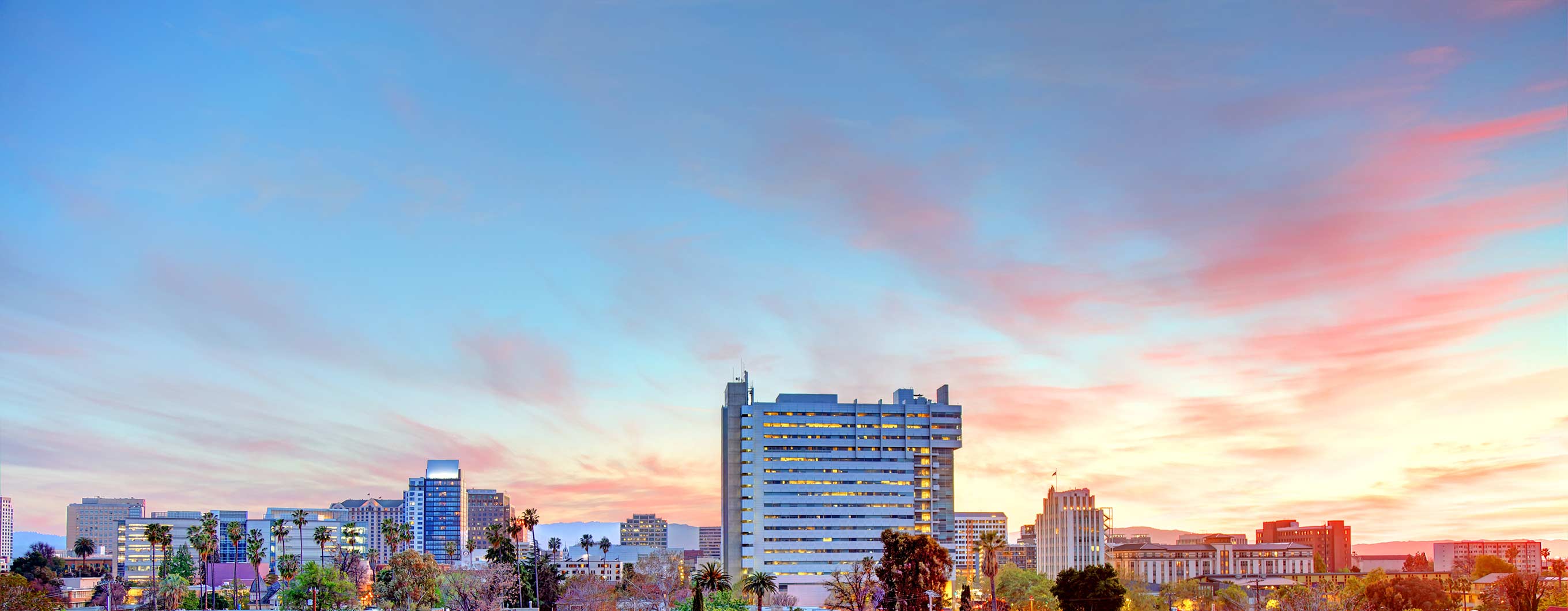
Homeowners Insurance in San Jose
San Jose is known for its mountains, scenic coastal village set in a beautiful bay, and some of the world's most famous forests.
However, with this stunning landscape, the city's varied terrain can pose a few challenges for homeowners, like strong winds, wildfires, and earthquakes. That's why having homeowners insurance is important. It could help protect your home and personal belongings from unexpected events.
How much is the average homeowners insurance in San Jose, CA?
The cost of home insurance in San Jose could vary based on factors like your home's value, location, age, and coverage limits. On average, San Jose residents pay about $1,090 [1] per year.
Curious about how rates have changed across California over the past five years? The table below shows the average yearly costs statewide.
Keep in mind, these are statewide figures. Your rate might vary based on where you live. Factors like home value, local weather, and population could affect your premium.
Year | Average Annual Premium [2] |
|---|---|
2025 | $1,633 |
2024 | $1,383 |
2023 | $1,225 |
2022 | $934 |
2021 | $1,018 |
What factors influence my home insurance rate?
Various factors could influence your San Jose homeowners insurance rates, such as:
- Location: Where your home is located is one of the biggest influences on your insurance cost. If you live in an area that's prone to natural disasters like wildfires, or one with a higher crime rate, you could expect to pay more for coverage in San Jose.
- Home value: Your home's value matters because it determines how much it would cost to rebuild if it's completely damaged. Insurance providers often check the home's purchase price and appraisal to set coverage limits.
- Home features: Certain features make your house riskier to insure. For example, if you have a swimming pool or trampoline, your premium will likely be higher due to the increased risk of injury. Outdated electrical, plumbing, or heating systems could also raise your rate because they're more likely to cause damage.
- Claims history: A clean claims history could save you money. Insurers reward customers who haven't filed many claims, often with discounts. On the flip side, having multiple past claims could lead to higher rates. Many home insurance companies in California use a CLUE report to check your home and auto claims from the last seven years.
- Coverage amount: The coverage amount you choose could also affect your premium. If you want a higher coverage limit to fully protect your home and belongings, you could pay more. However, this additional cost gives you peace of mind that you're better protected in case of a total loss.
Common insurance discounts in San Jose
San Jose residents could reduce their home insurance premiums by taking advantage of the following common insurance discounts:
- Multi-policy discount: If your insurance company provides more than just homeowners insurance, like auto or renters insurance, you could save by bundling. Buying multiple policies from the same company usually earns you a multi-policy discount.
- Claims-free discount: Homeowners who haven't filed a claim for a set number of years often receive a price break.
- New home discount: If your home was built recently, you might qualify for a new home discount. Newer homes are usually built to modern safety codes, which makes them less likely to have costly damage. Most insurers consider a home "new" if it's less than 10 years old.
- Protective devices discount: Install fire alarms, deadbolts, and security systems in your house or property. This could result in a reduced premium.
- Paperless billing or auto-pay discount: If you enroll in automatic payments or go paperless, it could sometimes provide small but helpful discounts.
What does home insurance in San Jose typically cover?
Home insurance in San Jose, CA, typically includes several types of coverage that help protect your home, belongings, and financial well-being. Here's what a standard homeowners insurance policy usually covers:
- Dwelling coverage: Dwelling coverage is the core of your home insurance policy. It pays to repair, rebuild, or replace your home if it's damaged by a covered loss. This might include things like fire, vandalism, theft, or severe weather (such as wind, hail, or lightning). It could also cover damage caused by outside forces, such as a falling tree branch.
- Personal property coverage: This part of your policy covers personal belongings inside your home. It can includes furniture, clothing, appliances, and your heating or cooling systems. If you own expensive items such as jewelry, fine art, or collectibles, you might need to purchase extra coverage to fully protect them.
- Other structures: Detached structures on your property – like a garage, shed, barn, outdoor fireplace, fence, swing set, or wall – are often also covered. Recreational items, such as trampolines or swimming pools, might also be included. However, because they pose a higher risk, you might need additional liability coverage.
- Loss of use: If your home becomes unlivable due to a covered event, loss of use coverage could help pay for temporary living expenses. This could include hotel stays, restaurant meals, or parking fees. Keep in mind that policies have set limits and timeframes, so check your policy details to know what's covered.
- Personal liability coverage: Liability coverage helps protect you financially if someone is injured on your property and decides to sue. It could help pay for legal costs, settlements, and medical expenses.
Note: Standard San Jose home insurance doesn't cover earthquakes or floods. You'll need separate policies for those types of disasters. Always review your policy and speak with your insurer to understand your exact coverage.
Additional San Jose insurance coverage options
Depending on your situation, you might want to consider adding extra coverage, known as endorsements.
- Earthquake insurance: San Jose is near several fault lines, and the earthquake hazard risk is high. Your standard home insurance won't cover earthquake damage, so San Jose homeowners may want to explore this coverage.
- Flood insurance: Though rare, floods could happen. Homes near creeks or low-lying areas might benefit from separate flood insurance.
- Extended replacement cost: This coverage may help pay for rebuilding your home in the event it’s damaged by a covered event.
- Scheduled personal property coverage: This helps protect high-value items like jewelry, artwork, or collectibles that might not be fully covered under standard limits.
- Sewer or water backup: This add-on coverage protects you if sewage or water backs up into your home or if your sump pump overflows. It could help cover the cost of cleaning up and repairing damage, including repairs to the sewer line within your property boundaries.
- Identity theft: Many insurers in San Jose, California, offer optional identity theft coverage. This optional coverage could help protect your identity by providing monitoring services and support with restoration efforts after a breach.
What San Jose residents need to know
Whether you dwell in San Jose or plan to buy a home, it's important to know a few key things, such as:
- Wildfire risk: While the city itself isn't as vulnerable, the nearby hills and dry climate could increase the risk of wildfires.
- Earthquake preparedness: Standard policies don't cover earthquake damage, so you may want to explore an additional earthquake insurance policy.
- High property values: With home prices consistently above national averages, you might need higher coverage limits.
- Local ordinances: Make sure your policy includes ordinance or law coverage in case you need to rebuild your home to current building codes after damage.
- HOA requirements: If you live in a condo or planned community, check with your HOA to ensure you have the required coverage.
How to lower your San Jose home insurance premium
Want to reduce your homeowners insurance premium in San Jose? Try these practical tips:
- Perform regular maintenance: A home that's in good shape is less likely to have claims, and that can help keep your premiums in check. Simple fixes, like sealing foundation cracks, cleaning gutters, or replacing old pipes, show your insurance company that you're proactive. And that could go a long way in reducing your risk profile.
- Don't just auto-renew; shop around: It's easy to let your policy auto-renew every year, but that could cost you. Instead, obtain at least three quotes when your renewal date approaches. Different insurers weigh things such as San Jose ZIP codes, proximity to a fire station, or your home's age in different ways, so shopping around could reveal a lower rate for the same (or better) coverage.
- Skip small claims when you could: Yes, home insurance could help, but not every problem needs to be filed. If your fence gets damaged in a windstorm or a window breaks during a backyard soccer match, it might be cheaper in the long run to pay out of pocket. Filing multiple small claims could flag you as a higher risk, which might lead to premium increases or even non-renewal. Save your coverage for the bigger stuff, like a kitchen fire or severe water damage, and handle the little things on your own when possible.
Still have questions?
Interested to learn more about homeowners insurance in San Jose? Here are some frequently asked questions.
How much is the property tax in San Jose, CA?
Property taxes in San Jose are based on the assessed value of your home and the current tax rate. As of 2024, the base property tax rate in Santa Clara County is approximately 1.46 % of a property's assessed value.
What salary do you need to live comfortably in San Jose?
Living comfortably in San Jose typically requires a household income of $136,739 per year for a single person. This estimate considers housing, transportation, food, insurance, and other basic expenses.
Sources
1 Information from NerdWallet.
2 Information from Quote Wizard, Yahoo Finance, Policygenius, and Bankrate.
This article is for informational purposes only and was compiled from sources not affiliated with Hippo. While we believe this information to be reliable, we do not guarantee its accuracy or completeness. For any insurance-related decision, please consult your licensed insurance producer.



